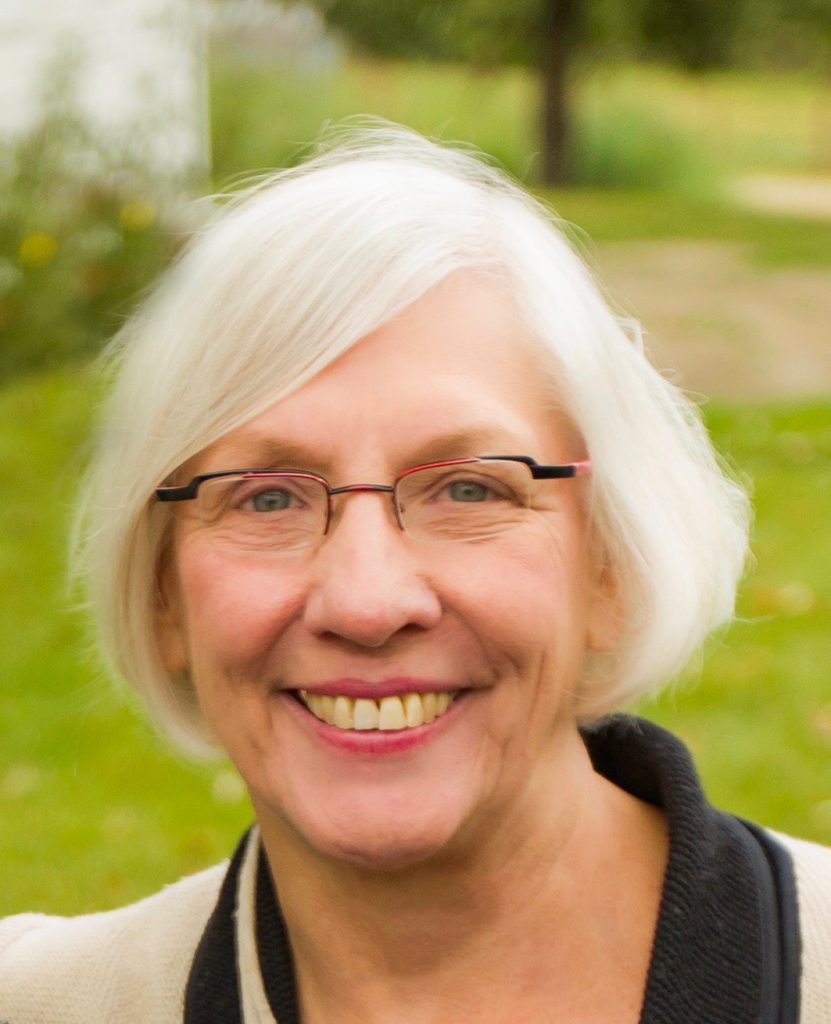Get involved with the next cohort of the Voices to End FGM/C project!
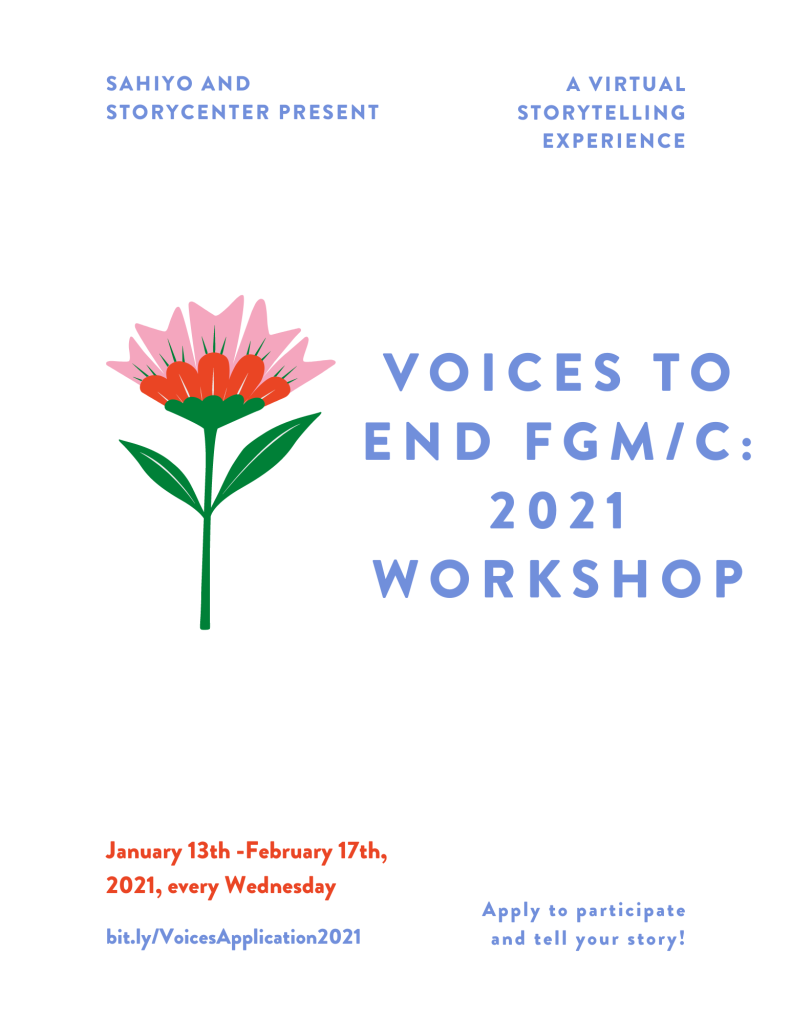
Since 2015, Sahiyo has provided various storytelling platforms for women and community members from all over the world to share their experiences of female genital cutting (FGC), in hopes of preventing this harmful practice from occurring to the next generation of girls. Now, we’re excited to announce our 2021 Voices to End FGM/C digital storytelling workshop, as part of our continued partnership with StoryCenter. This workshop is open to all individuals based in North America and Canada. Due to the pandemic, this workshop will be held virtually. [youtube url=”https://youtu.be/KnPykF1-Wg0″] When: Six online sessions held on consecutive Wednesdays, from January 13th through February 17th. 3:00 pm -5:00 pm Pacific Time / 6:00 pm-8:00 pm Eastern Time. Who: The workshop is open to women who have experienced FGM/C, as well as family members, friends, advocates, and others of any gender identity who would like to share a story. There is capacity for up to 12 storytellers. What: Each participant will create their own video through the use of voiceover audio, still images, and video clips. This participatory media process will be guided by facilitators from Sahiyo and StoryCenter. For those interested in taking part, fill out the application by Friday, December 11, 2020. Following the workshop, Sahiyo will support storytellers in publicly sharing their videos as part of our ongoing education and advocacy work to end FGM/C. If you would like more information on this revolutionary storytelling experience, email Mariya at mariya@sahiyo.com To see digital stories from previous “Voices to End FGM/C” workshops, click here.
Why human rights education, including FGC, is crucial for American classrooms
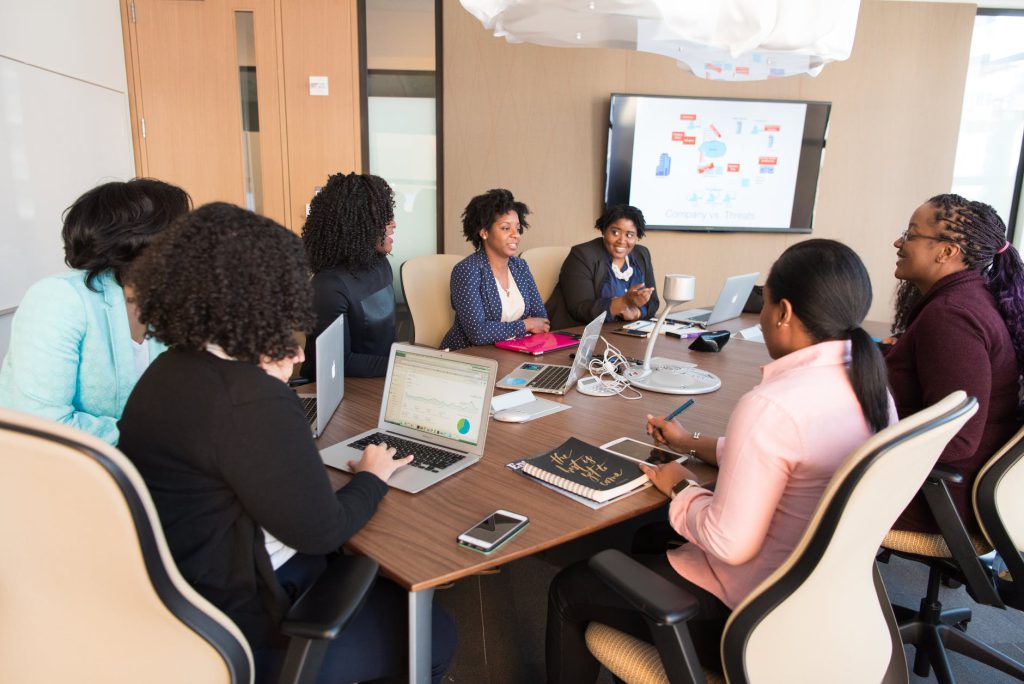
By Hunter Kessous Throughout high school, whenever I would tell people about my future goals to help survivors of female genital cutting (FGC), nine times out of ten the response would be, “What is FGC?” This is a question I never minded. As a human rights advocate, I’ve always taken the opportunity to educate my friends about this topic. I never expected that one day my peers at university would claim my desire to end the practice of FGC was neocolonialist, imperialist and simply wrong. I was shocked. I had read all about the harm that FGC causes to girls and women globally. I know, of course, that communities that practice FGC are protective of their tradition. However, I was completely unprepared to be met with hostility by my classmates. Soon, I noticed a trend: all of the students who were opposed to ending FGC were in the anthropology department. This left me even more puzzled—my experience with anthropology had been positive. We learned that culture is meant to grow and change over time. We learned about cultural relativism: the importance of viewing cultural practices through the lens of the culture itself. All of these things aligned with my view of FGC and approach toward abandonment. FGC is a cultural practice, but that doesn’t mean it can and should not change. Understanding the way communities that practice FGC view and justify their tradition is key to effectively encouraging abandonment of FGC. Why, then, do some anthropology students believe there should be no interventions to end FGC? Finally, I got answers. My global health professor led a discussion about FGC in class, which quickly turned into a ferocious debate between myself and three other students. Nearly all of what they said was untrue: FGC is a religious practice; medicalization makes FGC safe; and FGC is an African practice so we should not condemn it. FGC is often justified with religion, but it is not technically a religious practice. It pre-dates Islam and Christianity. Medicalization does not remove many of the physical and psychological dangers of FGC. It is a global practice-–happening even within the U.S.–that we should strive toward ending by allowing those from the communities that practice FGC to lead the initiative. These simple corrections were not well-received during the debate, potentially because the anthropology professors may have refused to take a stance on FGC as a human rights violation .. Herein lies the danger: misconceptions about FGC become all the more harmful when they are propagated by trusted sources. My experience showed me that the accuracy of information about FGC being taught in college classrooms desperately needs to be improved. Moreover, there is a general need for increased education about FGC in American classrooms. Public policy in England, as well as the state of Virginia (thanks to Angela Peabody of Global Woman P.E.A.C.E. Foundation), mandate that the harms, laws, and resources surrounding FGC be taught in sexual education courses for middle and high school students. These laws are important because we are raising the next generation of advocates. By teaching about FGC in schools accurately, we are empowering young people to be knowledgeable of and speak out against a human rights violation. This can and should be done through mandating FGC education in sex education classes and improving the accuracy of it being taught in university courses. To learn more about FGC, common misconceptions, and the importance of nationwide classroom education as a tool for FGC prevention, join Sahiyo for an educational webinar on July 30th at 1pm EST! Follow this link to learn more and register.
Utilizing Participatory Storytelling to Educate – A session at APHA 2019
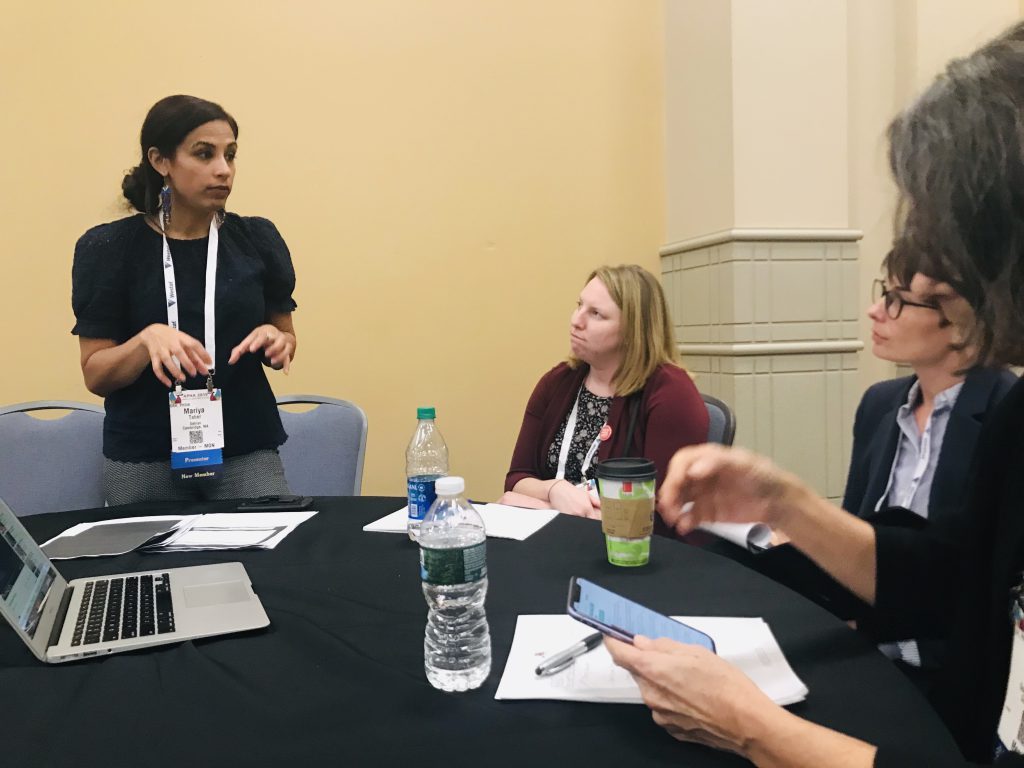
On Nov 4, 2019, Sahiyo’s co-founder Mariya Taher took part in a round-table session at the American Public Health Association’s (APHA) Annual Conference in Philadelphia, Pennsylvania to discuss the Voices to End FGM/C project. Participants were able to view a sample of the digital stories created by survivors. They were also able to learn how by utilizing participatory storytelling methods, we can educate communities, health professionals, and policymakers on female genital cutting. For more information, visit APHA’s website.
Sahiyo Stories screened at Academy of Communications in Healthcare Workshop
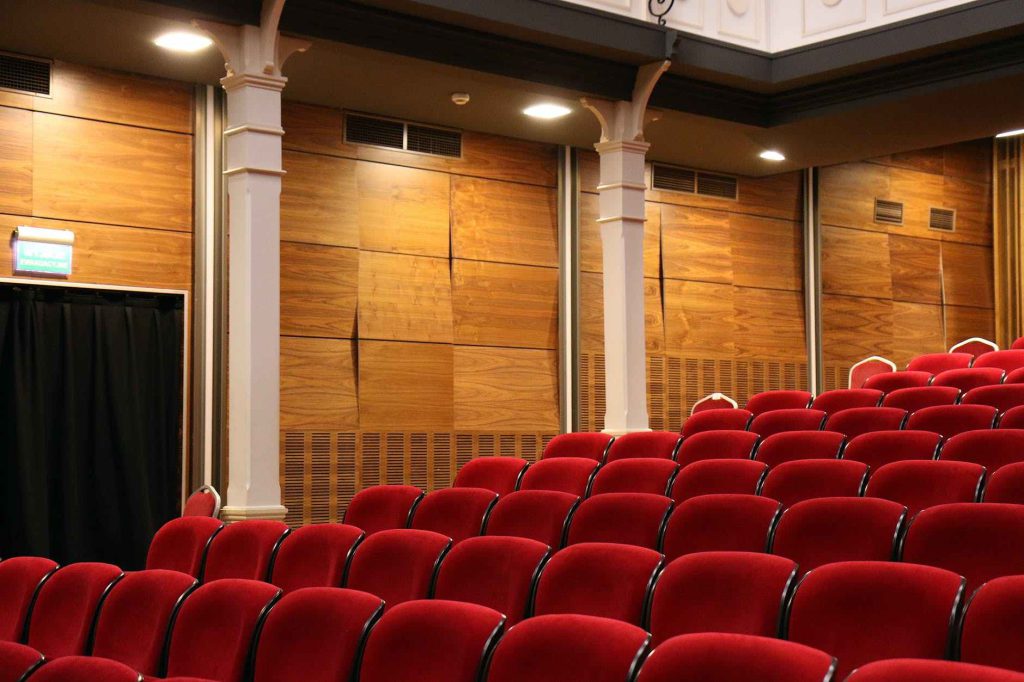
By Renee Bergstrom, EdD On January 30, 2019, I presented the workshop: Patient Engagement through Brief Focused Videos featuring the Sahiyo Stories at the Academy of Communication in Healthcare (ACH) Winter Course in Scottsdale, Arizona. ACH endeavors to promote empathy and better communication among health care providers, patients and families. I prepared throughout my adult life to someday share my story to advocate to end female genital mutilation/cutting (FGM/C). This groundwork included learning through formal education, plus strengthening the emotional, social and spiritual foundation of my being. The purpose in showing the Sahiyo videos was two-fold: to promote deeper understanding of female genital mutilation’s impact on survivors, and to discuss the storytelling process and the feasibility of ACH engaging patients’ trauma stories through focused videos. Three women attended the workshop I hosted, including the president of the organization who is a nurse midwife. After the workshop, their evaluations were positive. “I think this was a powerful video that was personal to Renee,” a participant said after watching my video. “It provided an example of what might be possible to create for patients through ACH. That would be an entire different brainstorm session. This video was so impactful that it was hard to move on in this session.” “Pre-work (writing story) was very helpful and heightened my receptivity/engagement.” I found it crucial to share Sahiyo’s work with the very caring doctors and nurses who are fellow faculty members and have placed the link to the Sahiyo stories on the ACH library page. Renee Bergstrom, EdD, is an educator who advocates for relationship-centered medical care. She and her husband, Gene, have been married 53 years. They have three children, ten grandchildren and one great-grandson. They live in a dynamic art town in midwest America where they are very involved in the community. Renee has been an advocate for women’s justice throughout her life.
‘I Hope my Story Helps other Women’: A Reflection on the Sahiyo Stories Workshop

World Bank Group hosts an informative workshop on FGM/C
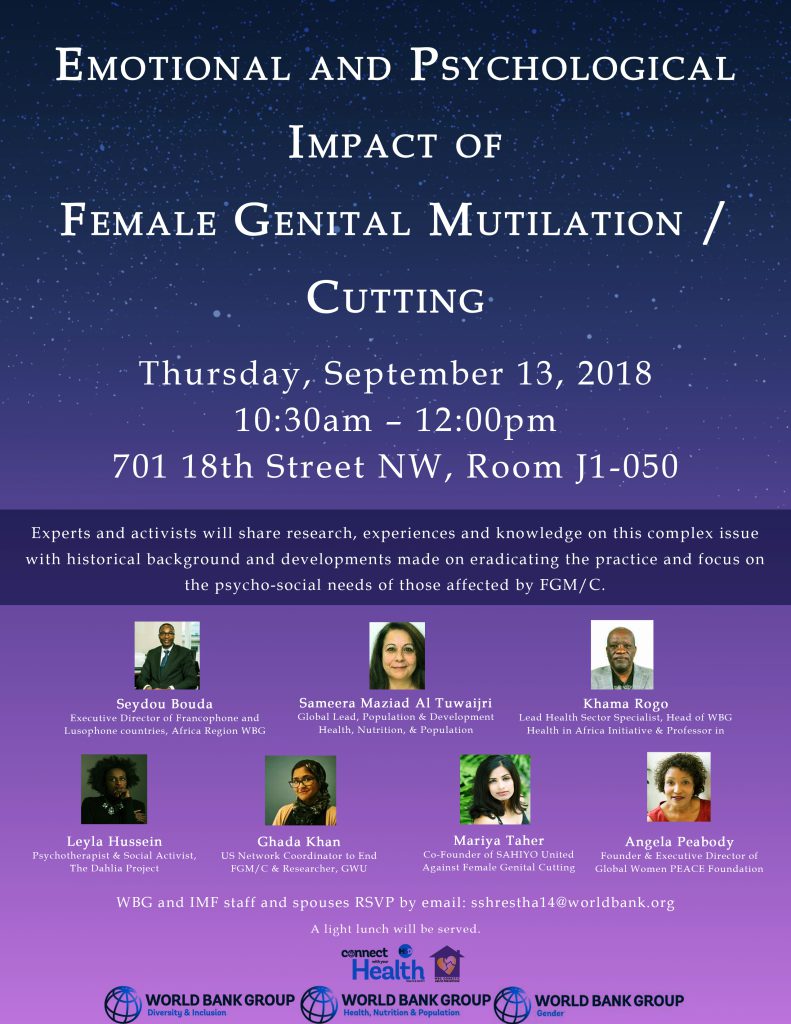
On September 13, the World Bank Group hosted an informative workshop titled, “Emotional and Psychological Impact of Female Genital Mutilation/Cutting.” Experts and activists shared their research, experiences, and approaches used to address FGM/C. The workshop also focused on a discussion around meeting the psychosocial needs of those affected by FGM/C. Speakers included Leyla Hussein (keynote speaker), Mariya Taher, Ghada Khan, Angela Peabody, Seydou Bouda, Sameera Maziad Al Tuwaijri, and Khama Rogo.
Sahiyo Storycenter Workshop: The Power of Storytelling
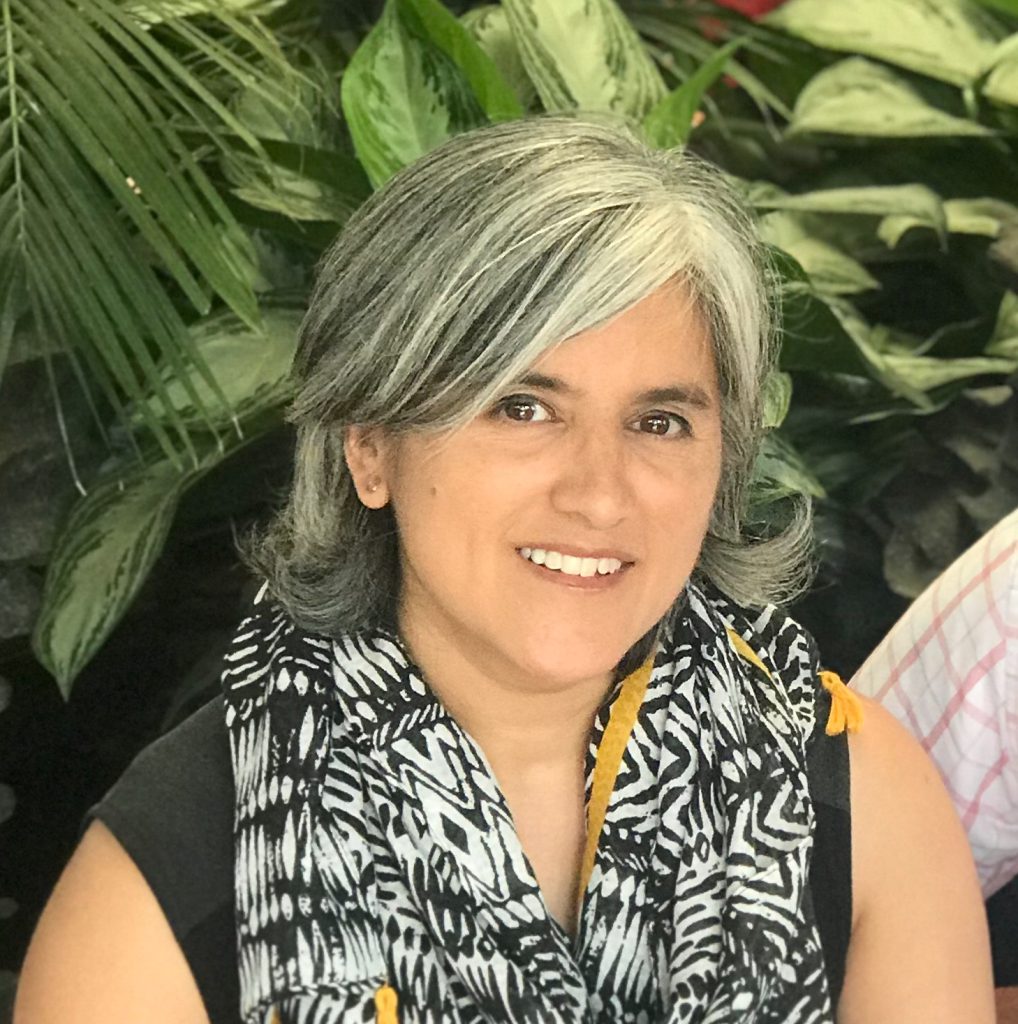
WeSpeakOut spearheads two-day workshop on ending FGC in India
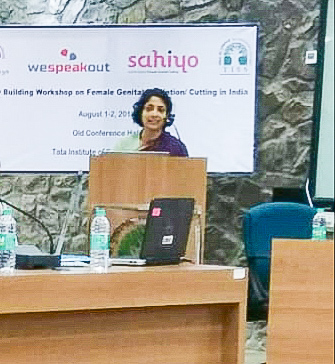
In a unique event bringing together activists working to end Female Genital Cutting and various stakeholders from civil society organisations, WeSpeakOut organised a two-day symposium at the Tata Institute of Social Sciences (TISS) in Mumbai on August 1 and 2. The symposium, titled “Strategy-building Workshop on FGM/C in India”, was organised in partnership with TISS, Nari Samata Manch and Sahiyo. More than 40 activists, survivors, and researchers participated in the workshop, including women and men from various sub-sects of the Bohra community, from different parts of India, feminists, academicians, and heads of several women’s rights and human rights organisations in the country. There were also international participants from Equality Now, a US-based organisation working to end FGC globally and Tasaru Ntomonok Initiative, an NGO working to end FGC in Kenya. Over two days, the workshop nurtured stimulating and productive discussions on various aspects of FGC and discussed strategies to advocate against the practice from the perspectives of law, health, community engagement and working with the youth and with men. The workshop was also an opportunity for activists from the community and those from outside the community to learn from each other.
Khatna Isn’t Black Or White, Just Like My Story
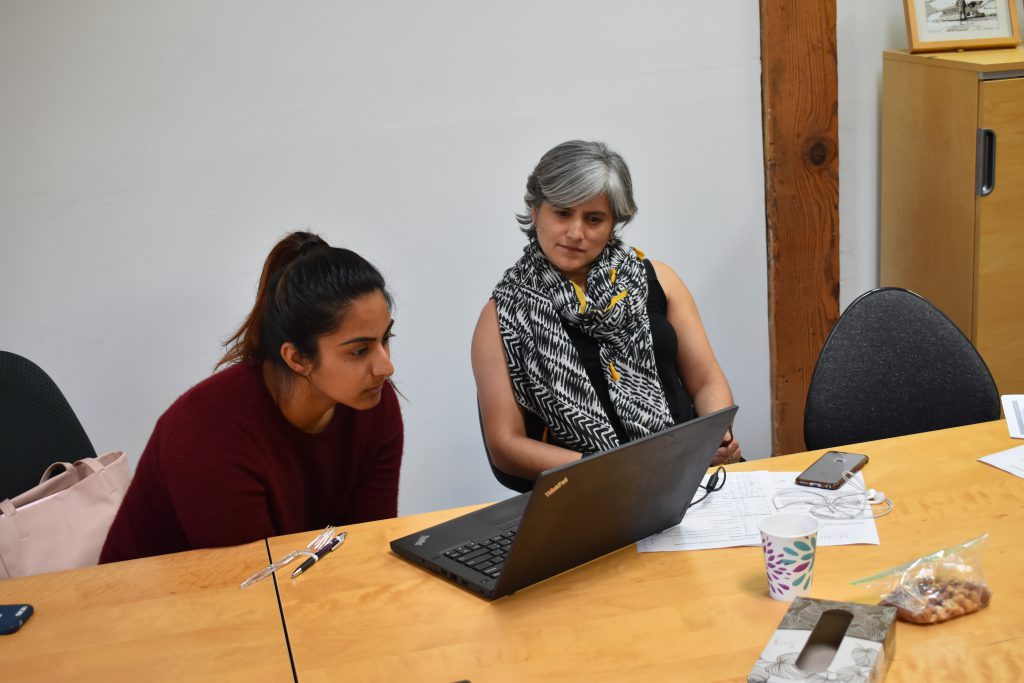
Why I Chose to Tell My Story About Female Genital Mutilation at the Sahiyo Stories’ Workshop
